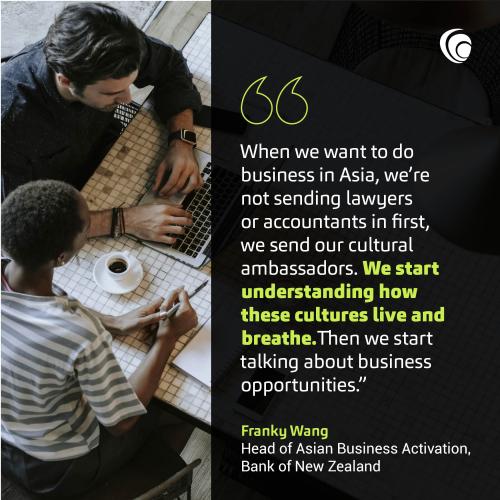Changing your business structure from sole trader to a company
Are you a sole trader or a contractor? As your business grows, you may find that you need to employ staff...
What strategies do organisations deploy to navigate cultural differences and understand the values of the people they deal with internationally? It’s an issue that was explored at the recent Baker Tilly Asia Pacific Conference in Auckland and elaborated on by Baker Tilly International in an article we’ve abridged here…
Time to read: 4 mins
 The beauty of the world lies in the diversity of its people, as the saying goes, yet values that resonate strongly in one society may be less important in another.
The beauty of the world lies in the diversity of its people, as the saying goes, yet values that resonate strongly in one society may be less important in another.
Effective business in a globalised world often requires an understanding of the values that are hallmarks of different cultural environments, which comes from developing cultural intelligence. Defined by one academic as the ability to interpret a stranger’s behaviour the way the stranger’s compatriots would, cultural intelligence is the platform on which different parties understand each other’s values and build trust.
When executed well, it is a key factor in unlocking new markets and conducting trade. An established international footprint can be a key marker of success in business growth, and the names published on lists of firms to watch are usually eyeing off new and bigger overseas markets.
Baker Tilly’s recently released Global Dealmakers 2023 market outlook is a snapshot of the globalisation of business. In 2022, about US$1.4 trillion worth of cross-border merger and acquisition transactions were carried out across sectors as diverse as materials, finance and consumer staples.
But it is not just international financial growth at stake when discussing cultural intelligence. As societies change through immigration and become more diverse, cultural insight is increasingly necessary at a domestic level. Knowing important cultural holidays and understanding whether to bow or shake hands in a greeting are useful parcels of knowledge, but may be scratching the surface when it comes to progressing a business deal, growing a new customer market or engaging with employees from a different cultural background.
Global recruitment consultancy Mercer has conducted research into the values that employees believe makes a fulfilling workplace, grouped by global regions.
The one consistent finding among all regions was the need for employees to feel their contributions were valued by their employer, and that an absence of understanding what valued means to an individual heightens the risk of an employee walking away or a deal falling through.
What strategies do organisations deploy to navigate these cultural differences and understand the values of the people they deal with?
Baker Tilly explored this issue at its recent Asia Pacific conference in Auckland, facilitating discussions about the role cultural intelligence plays in cultivating business opportunities and employee relationships.
New Zealand is a living study in evolving culture and Auckland, as our commercial capital and largest city with around 1.5 million people, is the embodiment of this shift. In 1991, only 5 per cent of Auckland’s residents identified as having Asian ethnicity but by 2018, this had increased to 28 per cent and it is projected to be at 35 per cent by 2038.
Franky Wang is one migrant who has made New Zealand home after arriving as a 17-year-old from Shanghai. Now the Head of Asian Business Activation at BNZ, he has been involved in the banking sector for about 12 years, watching it evolve alongside his chosen home.
“The end goal is creating an inclusive place to live but also collaborating together, helping to support growth,” he told delegates at the Baker Tilly APAC Conference. “We’re constantly looking for answers about navigating culture differences, and solutions for bridging the gaps between divisions where necessary.”
For Mr Wang, success starts with building deep relationships, the sort that can take months and years to forge, and he leverages strong professional networks. That is no great revelation but it’s a glimpse into the mindset – cultural intelligence cannot be achieved overnight.
Mr Wang said better engagement with Asia and Asian people in New Zealand was a deliberate strategy first implemented four years ago and it became a turning point for BNZ. “This is the way that we actually create an ecosystem, through the influence that we believe is going to benefit business leaders and customers, eventually growing our country” he said.
Doing business in the Asia Pacific region, says Mr Wang, is about “culturalising the commerce, not commercialising the culture.”
“When we want to do business in Asia, we’re not sending lawyers or accountants in first,” he said. “We send our cultural ambassadors. We start understanding how these cultures live and breathe. Then we start talking about business opportunities.”
The trade relationship between China and New Zealand is one such story that has continued to deliver benefits as ties have grown stronger.
New Zealand was one of the first developed countries to sign a free trade agreement with China, which took effect in 2008. An explosion of trade resulted, with China accounting for 62.5 per cent of New Zealand’s export growth over the past decade, which has risen to over 70 per cent in the last five years.
While China is now New Zealand’s number one export destination, shipping US$22.5 billion of goods in 2021, New Zealand also imports US$10.2 billion from China.
The Free Trade Agreement certainly laid the groundwork for closer business ties, yet the importance of business leaders’ insights to navigate cultural differences should not be overlooked.
Our website uses cookies to help understand and improve your experience. Please let us know if that’s okay by you.
Cookies help us understand how you use our website, so we can serve up the right information here and in our other marketing.